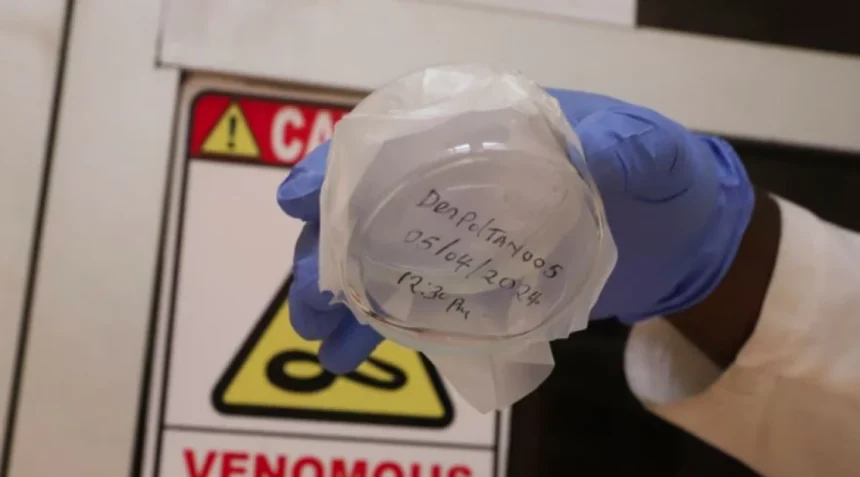Esther Kangali felt a sharp pain while on her mother’s farm in eastern Kenya. She looked down and saw a large snake coiling around her left leg. She screamed, and her mother came running.
Kangali was rushed to a nearby health center, but it lacked antivenom to treat the snake’s bite. A referral hospital had none as well. Two days later, she reached a hospital in the capital, Nairobi, where her leg was amputated due to delayed treatment.
The 32-year-old mother of five knows it could have been avoided if clinics in areas where snakebites are common are stocked with antivenom.
Kitui County, where the Kangalis have their farm, has Kenya’s second highest number of snakebite victims, according to the health ministry, which last year put annual cases at 20,000.
Overall, in Kenya, about 4,000 snakebite victims die every year while 7,000 others experience paralysis or other health complications, according to the local Institute of Primate Research.
Residents fear the problem is growing. As the forests around them shrink due to logging and agricultural expansion, and as climate patterns become increasingly unpredictable, snakes are turning up around homes more frequently.
“We are causing adverse effects on their habitats like forest destruction, and eventually we are having snakes come into our homes primarily to seek for water or food, and eventually we have the conflict between humans and the snakes,” said Geoffrey Maranga, a senior herpetologist at the Kenya Snakebite Research and Intervention Center.
Climate change also can drive snakes into homesteads, he said, as they seek water in dry times and shelter in wet.
Maranga and his colleagues are part of a collaboration with the Liverpool School of Tropical Medicine to create effective and safe snakebite treatments and ultimately produce antivenom locally. Maranga’s center estimates that more than half of people bit by snakes in Kenya don’t seek hospital treatment — seeing it costly and difficult to find — and pursue traditional treatments.
Kenya imports antivenom from Mexico and India, but antivenom is usually region-specific, meaning a treatment in one region might not effectively treat snakebites in another.
Part of the work of Maranga and colleague Fredrick Angotte is extracting venom from one of Africa’s most dangerous snakes, the black mamba. The venom can help produce the next generation of antivenom.
“The current conventional antivenoms are quite old and suffer certain inherent deficiencies” such as side effects, said George Omondi, the head of the Kenya Snakebite Research and Intervention Center.
The researchers estimate the improved conventional antivenoms will take two or three years to reach the market. They estimate that Kenya will need 100,000 vials annually, but it’s not clear how that much will be produced locally.
The research aims to make antivenom more affordable to Kenyans. Even when antivenom is available, up to five vials are required, which can cost as much as $300.
Meanwhile, the research center also does community outreach on snakebite prevention, teaching health workers and others how to safely coexist with snakes, perform first aid and treat those affected by snakebite.
The goal is to have fewer Kenyans suffer like Kangali’s neighbor, Benjamin Munge, who died in 2020 four days after a snakebite because the hospital had no antivenom.
It’s unlikely that snakes will move away from homes, Kangali’s mother, Anna, said, so solving the problem is up to humans.
“If the snakebite medicine can come to the grassroots, we will all get help,” she said.



